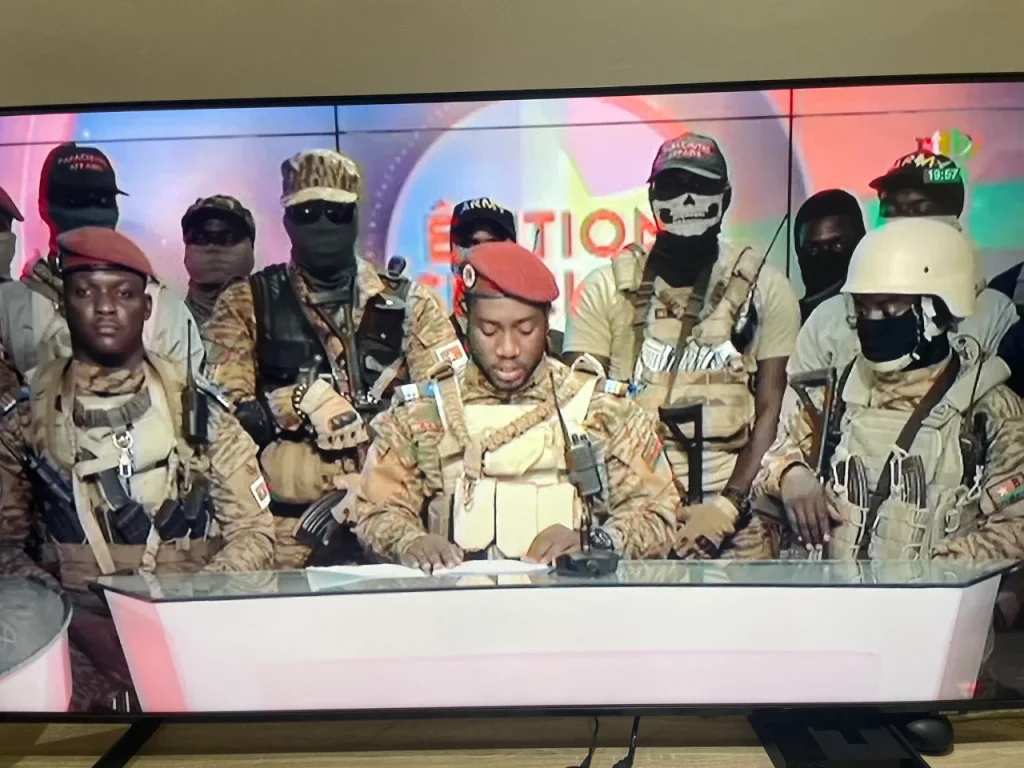Early Friday morning, gunfire was heard in the Ouagadougou 2000 neighbourhood of Burkina Faso’s capital, Ouagadougou, which is home to the president, the national television building, and the offices of the military junta that took control in January. Soldiers stationed at the city’s major junctions blocked many roadways in the capital.
On Friday evening, it became evident that a handful of rebellious troops had executed another coup in the West African nation. Lt. Col. Paul-Henri Sandaogo Damiba, commander of the junta and president of the nation, was overthrown by the coup plotters, who proclaimed it on state television. The military declared 34-year-old Captain Ibrahim Traore the new head of the nation in a live broadcast on state television.
Coup plotters said that the move was in response to the continuous worsening of the security situation. They said Damiba’s actions progressively persuaded them “that his ambitions deviated from our intentions.” The coup plotters promptly dissolved the government, suspended the constitution and transitional charter, locked the country’s borders indefinitely, and put limitations on political and public life.
Roque Kabore, the democratically elected president of Burkina Faso, was deposed by Damiba and his associates barely nine months earlier, with the promise of making the nation safer. However, violence in the nation persists, and disenchantment with Damiba’s administration has intensified in recent months. More than forty per cent of Burkina Faso’s land is outside the government’s jurisdiction, and terrorist strikes there have increased in frequency this year. It is estimated that al-Qaeda and Islamic State (IS) affiliated organisations are active in ten of the country’s thirteen provinces. In recent months, tensions within the military have escalated as President Damiba has been unable to restore national security. According to the United Nations, the fighting with terrorist organisations has displaced about 10 per cent of the country’s population or 1.9 million people.

Damiba’s whereabouts were unclear immediately after the coup. According to a statement claimed to Damiba after the coup, “talks are underway to restore peace and tranquillity”. “Let us remain united for the triumph of peace and security,” the statement continued. The coup occurred two days after Damiba returned from the 77th session of the United Nations General Assembly in New York when he made a speech as the formal head of state.
Shortly before the coup in the capital Ouagadougou, protestors demanded Damiba’s resignation, an end to French military involvement in the Sahel, and the beginning of military collaboration with Russia. In recent years, Moscow’s influence has continued to increase in several Francophone African nations, and Russian flags are often visible during rallies. As a result of the government’s incapacity to address security issues, many civilians and troops originally embraced the coup.
At the beginning of September, the leaders of the juntas in Burkina Faso and Mali – Lt. Col. Paul-Henri Sandaogo Damiba and Col. Assimi Goïta – met in the Malian capital of Bamako and agreed to “strengthen their military partnership.” However, the Malian junta, which came to power in May 2021, has gradually turned its back on France and its allies. After nine years of battling Islamists and under pressure from Bamako, the French army turned up its sites in Mali to the government and departed the country in August. In place of the French in Mali, Russian mercenaries from the Wagner private military firm were welcomed.
The African Union (AU), the European Union, and the United Nations denounced the latest coup in Burkina Faso on Saturday. After the military coup, the president of the AU Commission, Moussa Faki Mahamat, criticised the “unconstitutional change of government” in Burkina Faso.
The AU issued a brief statement stating, “The President calls on the military to immediately and completely desist” any violence and threats against the civilian population, civil liberties, and human rights. Musa Faki Mahamat also demanded that election timelines be carefully adhered to restore the constitution no later than July 1, 2024.
The military junta in Burkina Faso suspended the constitution and dissolved the government and legislature without deciding on a transition schedule that was agreed upon with the Economic Community of West African States (ECOWAS) in July and called for the restoration of civilians to power by July 2024.
Josep Borrell, the director of European diplomacy, said that the European Union condemns the recent coup in Burkina Faso and asks for the restoration of constitutional order. The coup “endangers the efforts made for months, in particular by ECOWAS, to mark the framework of the transition”, Borel said in a communique.
UN Secretary-General Antonio Guterres strongly condemned “any attempt to seize power by force of arms” and called on all participants in the conflict in Burkina Faso to “refrain from all violence and seek dialogue”.
